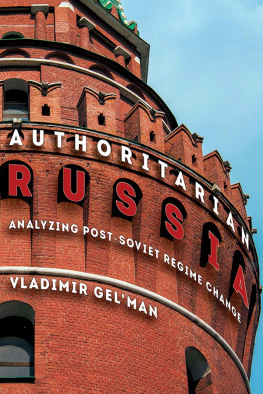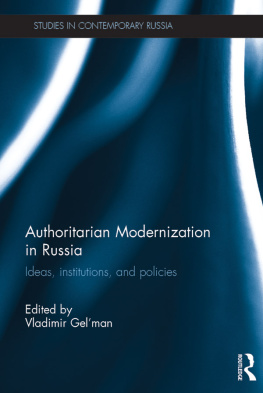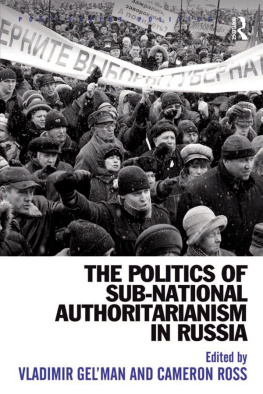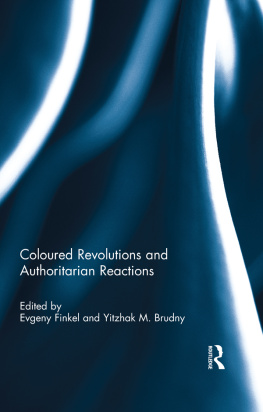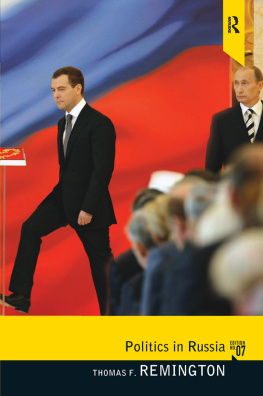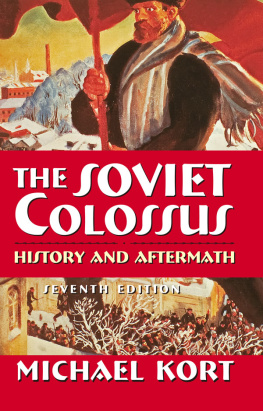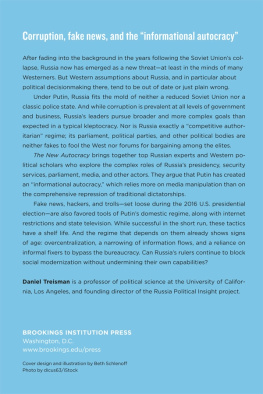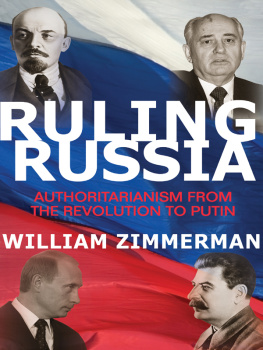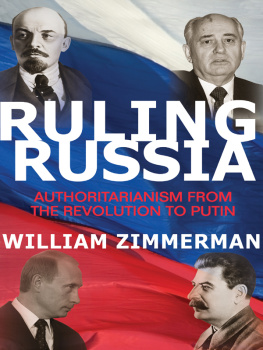ACKNOWLEDGMENTS
THIS BOOK HAS BEEN the result of numerous scholarly ventures over several years, and several institutions and many people have accompanied me in these ventures in various ways. First and foremost, I am indebted to my academic home, the European University at St. Petersburg, where I have been honored to teach and conduct research since 1996. The experience of an encouraging scholarly environment, support from the university leadership, and exchanges of ideas with colleagues in the Department of Political Science and Sociology and the Center for Modernization Studies have greatly enriched me and shaped my agenda to a major degree. I would like to thank, in particular, Grigorii Golosov, Boris Firsov, Oleg Kharkhordin, Boris Kolonitsky, Ella Paneyakh, Eduard Ponarin, Mikhail Sokolov, Anna Temkina, Dmitry Travin, Vadim Volkov, Andrei Zaostrovtsev, and Elena Zdravomyslova. A number of talented former students (some of whom went on to become scholars themselves) encouraged me to provide them with better examples of my own researchespecially Elena Belokurova, Alexey Gilev, Kirill Kalinin, Egor Lazarev, Maria Nozhenko, Yevgeniya Popova, Andrey Scherbak, Anton Shirickov, Andrei Starodubtsev, Anna Tarasenko, and Margarita Zavadskaya (to name just a few).
I also owe a major debt to the Aleksanteri Institute at the University of Helsinki, where I have worked since 2012 as a Finland Distinguished Professor thanks to the support of the Academy of Finland. The Institutes director, Markku Kivinen, offered me a unique opportunity to be the servant of two masters and to work and live in two cities, St. Petersburg and Helsinki. My special thanks go to my Finland-based colleagues, especially Risto Alapuro, Sari Autio-Sarasmo, Jukka Gronow, Tuomas Forsberg, Markku Kangaspuro, Meri Kulmala, Jussi Lassila, Markku Lonkila, Arkady Moshes, Anna-Maria Salmi, Hanna Smith, and numerous others. We discussed various drafts of book chapters and some related pieces during many seminars and conferences, from Perm to Iowa City and from Uppsala to Vienna. Among many scholars with whom I found it useful to exchange ideas and share thoughts, I would like to thank Harley Balzer, Mark Beissinger, Irina Busygina, Samuel Greene, Henry Hale, Stephen Hanson, Stefan Hedlund, Tomila Lankina, Maria Lipman, Maria Matskevich, Marie Mendras, Petr Panov, Nikolay Petrov, William Reisinger, Thomas Remington, Kirill Rogov, Richard Rose, Cameron Ross, Peter Rutland, Richard Sakwa, Gulnaz Sharafutdinova, Regina Smyth, Konstantin Sonin, Daniel Treisman, Lucan Way, William Zimmerman, and Natalia Zubarevich. To this list can be added Alena Ledeneva, Mary McAuley, and Sergei Ryzhenkov, who supported me at various stages of the long research journey, both as scholars and as close friends; I greatly appreciate their professional and personal understanding and inspiration.
This book would never have appeared without support from several organizations. It represents part of the collective research program of the Center of Excellence Choices of Russian Modernization, funded by the Academy of Finland. The Program on New Approaches to Research and Security in Eurasia (PONARS Eurasia) has served as a major forum for discussing many ideas contained in this book. I would like to thank the University of Pittsburgh Press and especially Jonathan Harris, who initially endorsed the book proposal, and Peter Kracht, who put it forward and turned it into a real project. Two anonymous reviewers provided a number of useful comments on the draft of the book manuscript. Finally, the friendly, detailed, and nuanced linguistic assistance provided by Alexei Stephenson, Frances Weightman, and Maria Roti was essential for making the manuscript readable.
The earlier versions of some parts of this book previously appeared in the form of articles: elements of are based upon Regime Changes in Russia: Trajectories of Political Evolution, (Russia 2025: Scenarios for the Russian Future, eds. Maria Lipman and Nikolay Petrov [Palgrave Macmillan, 2013]). Needless to say, none of the above persons and organizations is responsible for any errors. All arguments in the book solely reflect my own viewpoints, which may not coincide with their opinions.
Last but not least, all roads lead to home. My family is the main and outstanding source of support in everything I do in my professional life. I could never have completed this work without love, patience, and encouragement from Oxana and Eva, to whom I dedicate this book.
PREFACE
IT WAS A VERY lovely and sunny day in the summer of 1990 when I sat at the reception hall in the Mariinsky Palace in (then) Leningrad. I was a twenty-four-year-old activist for the anti-Communist prodemocratic movement, which had gained a majority of seats during the recent city council elections. After this victory, I had received two rather different job offers from two groups of my acquaintances. One was from a team of sociologists, who conducted research on political and social changes in the city and in the country as a whole. They invited me to join their ranks and argued that my insider knowledge of emerging social movements would be a great advantage in launching a professional career in the study of politics. The other group included newly elected deputies, who were busy arranging a new system of city government; they believed that my experience of electoral campaigns and my reputation as an activist would be a key asset for improving a rather chaotic decision-making process. I had to choose between a junior research fellowship at the Institute of Sociology of the Academy of Sciences, and a somewhat mid-range position in the newly formed apparatus of the city council. The latter option initially sounded tempting, and I came for a job interview with the chair of the city council, Anatoly Sobchak. A professor of law who had been elected to the Soviet parliament during the first semicompetitive elections in 1989, he had gained great popularity as a vocal and outspoken critic of the Soviet system; the following year, Leningrad deputies invited Sobchak to serve as chair of the city council upon winning a seat in the by-elections. As usual, he took a long time to arrive, and while waiting for him, I chatted with a receptionist named Dima, a smiling, talkative guy the same age as myself.
Finally, Sobchak arrived, and we went to his extraordinarily large office, with its excellent view of St. Isaacs Cathedral. Without asking me anything or even taking my presence into account, my potential boss began a long and passionate speech, as if he were giving a talk before hundreds of people, even though nobody else was in the room (I think he used this opportunity as a testing ground for one of his public appearances, which were bringing him countrywide fame at that time). Sobchaks speech was full of bright rhetoric but rather vague in substancehe blamed the previous system, complained about current turbulence, and promised that the city would flourish under his leadership. After a seemingly endless speech, he paused, and I was able to ask a question I considered essential for my future job: Anatoly Aleksandrovich, how do you perceive the system of city government that you plan to build?
Sobchak turned toward me at last, shifted his attention down to earth, and changed his tone to a more sincere and frank register. Well... there are the city council deputies, who are numerous, noisy, and disorganized; they have to respond to the complaints of ordinary citizens and mostly work in their local constituencies instead of having long discussions. Then there is the city executive committee; it should deal with matters of everyday routine, such as bumpy roads and leaking pipes, but not go beyond such duties. And I myself [a broad glance around the office], with the aid of my apparatus [a close look at me], will conduct politics in the city. I was shocked to hear these rather cynical words from a person who had a public image as a democratic icon. But this sounds almost the same as what we had before, under the Communists... and what about democracy? Sobchak was probably surprised that someone who was supposed to become a member of his emerging team had posed such a nave question. He responded firmly, as certain university professors often do when they pretend to tell the truth to freshmen: You know, we are in power nowthat is democracy (literally, in Russian:

